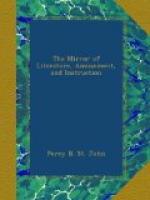gentry in the neighbourhood; but the housekeepers were
never invited by his daughters, a point of propriety
in male and female acquaintanceship which amused us
not a little. His business was of a most multifarious
description, and besides the trades of bookseller,
stationer, and druggist, he had a printing-office,
and was, moreover, a self-taught printer, He was post-master
and stamp sub-distributor, receiver of bail, and agent
for insurances—little official appointments
which would have made him mayor in a corporate town.
Of late years, he seldom meddled with these matters
of business; but tired of their common track, he struck
out a course of life, which was neither public nor
private, but made him a sort of oracle in the town,
whose opinions were freely printed and gratuitously
circulated, whilst the author was seldom seen except
at vestry-meetings. In this way he acted as secretary
to a benevolent society established by the gentry,
and such was his enthusiasm that he gave his services
and L200. worth of printing during the first year;
and the Committee in return presented him with a handsome
piece of plate with a complimentary inscription, which
he had the modesty to keep locked up, and never to
display even to his visiters. This proved him
to be a benevolent man, and he would have been ten
times more useful had not his charitable disposition
been over tinged with oddity and caprice. His
contact with the poor of the parish soon made him
overseer, although his religious observances would
not qualify him for churchwarden; for he only went
to church at funerals, to which he was frequently invited,
his staid appearance, and a certain air of gentility
of which he was master, being in such cases no mean
recommendation. Overseer and select vestryman,
he printed the parish accounts, for the most part
gratuitously, although the poor and even the better
portion of the towns-people never gave him full credit
for this generosity, conceiving that he was repaid
by some secret services or funds. The oddity
of his pursuits was only exceeded by their variety.
In politics he was a disciple of Cobbett, and year
after year, foretold a revolution, an alarm which
he communicated to every one of his household.
He took extreme interest in all new mechanical projects,
but seldom indulged in the practical part of them.
In wine-making he was once a very experimentalist,
and studied every line of Macculloch and unripe fruit;
next, he turned over every inch of his garden, analyzed
the soil a la Davy, and salted all his
growing crops. His cogitative habits led him
to take long walks in the country, and he soon flew
from horticultural chemistry to real farming; and
about the same time took to road making and macadamization,
and became a surveyor of the highways. But the
trustees wanting to macadamize the miserably pitched
street of the town, he bethought him of dust in summer
and mud in winter, and drew up a long memorial to
the lords of the soil, remonstrating with them on their




